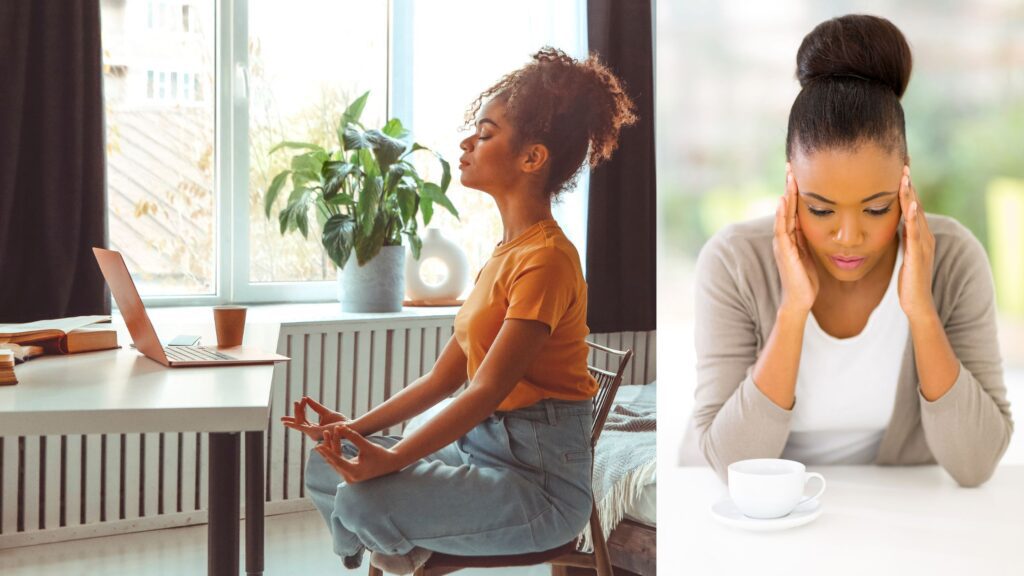
In a world where societal norms, cultural expectations, and historical prejudices often weigh heavily on women of color, Black and Brown women are finding their voices, standing up for themselves, and demanding space in a world that has too often tried to silence them. This process is not easy—it’s a path filled with mental and emotional stress, but also one that leads to profound accomplishment and empowerment.
The Weight of Societal Expectations
For Black and Brown women, standing up for themselves often means confronting layers of intersectional oppression. These women face the complex challenges of being both women and people of color, navigating racial, gender, and sometimes even class-based discrimination. They grow up in a world that often dismisses their worth, perpetuates stereotypes, and imposes rigid roles. Whether it’s at work, in their communities, or in their own homes, women of color are frequently forced to prove their worth and fight for recognition, respect, and autonomy.
This constant battle can take a significant toll on mental health. Black and Brown women are more likely to experience high levels of stress, anxiety, and depression due to the compounded impact of racism, sexism, and cultural expectations. The burden of being expected to “do it all,” while also carrying the weight of societal microaggressions and discrimination, can feel overwhelming.
However, within this mental and emotional struggle lies incredible resilience. Standing up for oneself, despite these pressures, is not just an act of defiance but an act of survival and empowerment.
Mental Stress and Emotional Labor
The mental stress Black and Brown women experience when standing up for themselves is rooted in multiple sources:

- Microaggressions and Bias: These women often encounter subtle yet pervasive forms of racism and sexism in daily life—at work, in social spaces, and even in their personal relationships. A comment like, “You’re so articulate for someone from your background,” or being overlooked in professional settings because of their race or gender, can trigger feelings of frustration and self-doubt.
- Fear of Repercussions: For many, standing up for themselves is not without consequences. Black and Brown women often face the added fear of being labeled as “angry,” “difficult,” or “aggressive” when they assert their boundaries or advocate for their needs. This can result in career setbacks, social isolation, or even being discredited in their communities.
- Cultural Expectations: In some cultures, there is pressure for women to maintain certain roles, such as being the caretaker, the nurturer, or the “strong one” who never complains. Challenging these expectations can cause internal conflict, leading to feelings of guilt or fear of disappointing loved ones.
- The Emotional Labor of Advocacy: Standing up for oneself is often not just about speaking out for personal benefit—it also involves advocating for entire communities. Black and Brown women often feel the burden of representing not just themselves but their entire race, family, or culture, especially in predominantly white spaces. This emotional labor is taxing and can sometimes feel isolating.
Accomplishments: A Journey of Strength and Empowerment

Despite the mental stress, standing up for themselves is an act of immense courage. It’s about carving out space in a world that often tries to diminish them, and in doing so, Black and Brown women experience significant personal and collective victories. Here are just a few of the accomplishments and transformations that come with asserting their worth:
- Breaking Down Barriers: Every time a Black or Brown woman asserts herself in a room where she feels unseen, unheard, or disrespected, she is not just advocating for herself—she is challenging systemic barriers. Whether it’s in the workplace, at school, or in social movements, women of color are leading the charge in breaking down racial and gender barriers. Their activism and leadership are reshaping industries and communities. Example: Think of the rise of Black women in politics like Kamala Harris, who made history as the first woman, Black, and South Asian Vice President of the United States, or activists like Patrisse Cullors and Alicia Garza, co-founders of the Black Lives Matter movement. Their work demonstrates the power of standing up against systemic oppression.
- Empowering Others: When Black and Brown women stand up for themselves, they pave the way for others to do the same. Their courage to speak out encourages their peers, younger generations, and others from marginalized communities to advocate for their own rights and dreams. Their strength is contagious.
- Building Mental Resilience: Despite the challenges, the act of standing up for oneself builds mental resilience and self-confidence. It helps women of color reclaim their narrative and define their identity on their own terms. The more they assert their worth, the less power negative stereotypes and external opinions hold over them. This process transforms their self-esteem and gives them the mental tools to face future challenges with confidence.
- Shifting Cultural Norms: Each act of self-advocacy, whether in public spaces or personal relationships, contributes to changing the cultural norms that have historically marginalized women of color. By pushing against stereotypes and demanding better treatment, they are shifting the way society views women of color—not just as victims of oppression, but as agents of change, leaders, and equals in all areas of life.
The Emotional Healing Process

Standing up for themselves is not just about confronting external forces—it’s also about healing internally. For Black and Brown women, asserting their value can be a form of emotional liberation. They are reclaiming their right to exist fully, unapologetically, and with pride.
Self-advocacy involves recognizing that they deserve peace of mind, respect, opportunities, and well-being. It means recognizing their worth beyond what society has dictated, beyond stereotypes, and beyond limiting beliefs. This mental shift—this reclamation of self—is a powerful act of healing and transformation.
Taking Action: How Can We Support Black and Brown Women in This Journey?

While standing up for oneself can be empowering, it’s important to recognize that the journey is not easy, and it shouldn’t be done alone. Here are a few ways we can support Black and Brown women in their pursuit of self-empowerment:
- Acknowledge and Validate: Validate their experiences. Recognize the emotional and mental toll of standing up for oneself in spaces where they are marginalized. Listen without judgment and offer support.
- Create Safe Spaces: Whether it’s in the workplace, community groups, or home, create environments where Black and Brown women feel safe to express themselves, challenge norms, and assert their boundaries.
- Encourage Mental Health Care: Encourage mental wellness practices that prioritize self-care. Black and Brown women often face barriers to accessing mental health services, so providing access to culturally competent therapists and counseling services can make a significant difference.
- Celebrate Achievements: Every time a Black or Brown woman stands up for herself—whether it’s speaking out against discrimination, asking for a promotion, or setting a boundary—celebrate that victory. Acknowledge the strength it takes to assert one’s worth in a world that often tries to silence and diminish their voices.
Conclusion: The Journey Is Ongoing
Black and Brown women continue to rise above the mental stress and emotional labor they face daily as they stand up for themselves. Each act of self-advocacy is not just a personal victory; it is part of a larger cultural movement toward equality, justice, and empowerment. Despite the mental and emotional toll, the accomplishments of standing up for oneself are monumental—and they continue to inspire future generations of women to break free from the chains of societal expectations and define their own power.
The journey may be difficult, but it is also one of immense growth, resilience, and accomplishment. Black and Brown women are not just surviving—they are thriving and changing the world in the process.
